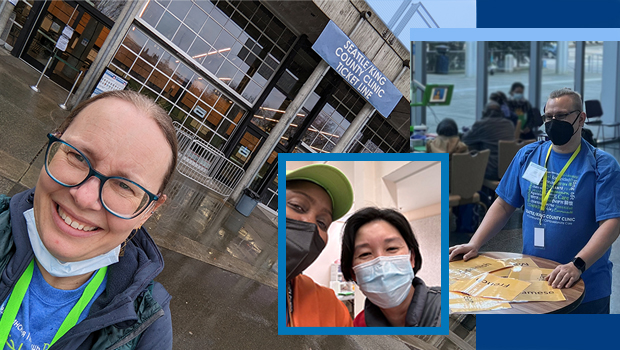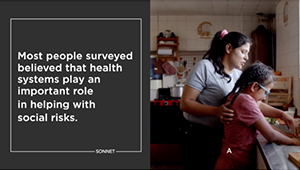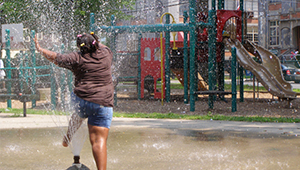Making a difference at the Seattle/King County Clinic

From left: KPWHRI’s Lisa Schafer, Juanita Jackson, Onchee Yu, and Eric Goemer volunteer at the 2024 Seattle/King County Clinic.
KPWHRI volunteers help deliver free medical, dental, and optical care to attendees of the 4-day clinic
On Feb. 15, Juanita Jackson, an account analyst for Kaiser Permanente Washington Health Research Institute (KPWHRI), woke up well before dawn so she could be at Seattle Center by 4:30 a.m. She, among hundreds of other volunteers, rose before the sun to support the annual Seattle/King County Clinic (SKCC). Over the 4-day event, volunteers — including over a dozen employees from KPWHRI — lent their time and skills so thousands of people could receive health care services many desperately needed.
SKCC started providing medical, dental, and optical care in 2014. This care also includes immunizations and imaging services such as mammograms and ultrasounds. Over the last 10 years, SKCC has provided health care services to over 27,000 people, saving them around $23 million of out-of-pocket health care costs. As detailed on the City of Seattle’s CityStream show, the recipients of these services may not be who you expect:
- 96% were housed.
- 66% were employed.
- 22% had insurance but could not access the type of care they needed.
For a majority of the patients, the number one reason for attending SKCC was because they couldn’t afford health care services.
“I remember growing up without those services,” Jackson said when reflecting on her time volunteering for SKCC. “I do this every year because it’s rewarding, it’s enjoyable.” In fact, Jackson has been involved since the clinic’s start. Now, she serves on the leadership team.
“I make sure to carve this time out every year,” she said. “When people smile and hug [after receiving care], it makes up for the long day. When people appreciate your time … it’s so warming.”
Volunteers make up every step of the clinic. Not only are health care professionals such as dentists and nurses needed, but also interpreters, IT support, and patient escorts, among other roles. As KPWHRI Senior Evaluation and Learning Consultant Lisa Schafer put it, “You don’t need technical skills — just be empathetic and flexible. You can just be a human, and there’s a role for you.”
Schafer has volunteered at SKCC for many years and has fond memories of working in patient intake. While the clinic takes place only once a year, it has an impact on her. “It is a fun way to be outside of the regular day to day and contribute, to be a slice in this much bigger effort. This is an opportunity to … meet the people who are affected by the work that you are doing. It is very restorative.”
KPWHRI employees are among the many volunteers from Kaiser Permanente Washington at this year’s event, including Angela Dowling, president of Kaiser Foundation Health Plan of Washington, and Linda Tolbert, MD, executive medical director of Washington Permanente Medical Group.
If you want to get involved, visit the Seattle/King County Clinic volunteer page. The next clinic will take place April 24 to 27, 2025.
If you or someone you know needs health care services, visit the SKCC patient page.
Kaiser Permanente was a Platinum Partner for the 2024 SKCC and has been involved since the clinic’s inception.
By Eric Goemer, a research support specialist at KPWHRI who has volunteered at SKCC for 2 years.
SONNET study

Social risks: Do patients want health systems to help?
New research led by Leah Tuzzio, MPH, looks at patients’ unmet social risks and their desire for assistance.
Healthy findings blog

How infrastructure projects can improve health, equity
A new brief spotlights health impact assessments as a process to improve planning for major developments.


